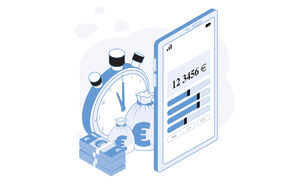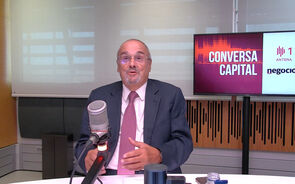The debt trap - artigo interessante
4 mensagens
|Página 1 de 1
Eu diria que é mesmo o tudo ou nada. Mas, curiosamente, quando alguns analistas (economistas) vêm a público "denunciar" os riscos enormes desta política, quando lhes perguntam qual seria a melhor alternativa, eles engasgam-se um bocado.  O jogo é perigoso, mas parece que a FEP prefere jogar os poucos trunfos que têm a deixar o jogo correr, com o risco de se arrastar numa derrota à partida condenada.
O jogo é perigoso, mas parece que a FEP prefere jogar os poucos trunfos que têm a deixar o jogo correr, com o risco de se arrastar numa derrota à partida condenada.
Esperemos que, se for uma roleta russa como diz o grande DJ, a bala more ao lado.
Já tinhamos saudades tuas, DJ!!!
Um abraço,
Ulisses
Esperemos que, se for uma roleta russa como diz o grande DJ, a bala more ao lado.
Já tinhamos saudades tuas, DJ!!!
Um abraço,
Ulisses
É por saber disto que o FED vai deixar as taxas abaixo da inflação mantendo-se o juro real negativo, enquanto a massa monetária cresce... cresce...
E o dólar vai caíndo !! O FED está envolvido num jogo perigoso, em que acredita que o forte crescimento económico vai devolver o equilibrio das contas públicas e privadas, ao mesmo tempo que as contas externas recuperariam.
É uma roleta russa... ou não !!
Um abraço
dj
E o dólar vai caíndo !! O FED está envolvido num jogo perigoso, em que acredita que o forte crescimento económico vai devolver o equilibrio das contas públicas e privadas, ao mesmo tempo que as contas externas recuperariam.
É uma roleta russa... ou não !!
Um abraço
dj
Cuidado com o que desejas pois todo o Universo pode se conjugar para a sua realização.
The debt trap - artigo interessante
Posted on Sat, Nov. 29, 2003
The debt trap
Consumers who fueled economic rebound find their purchases coming back to haunt them
SUSAN CHANDLER
Chicago Tribune
Domingo Enriquez was in the middle of a cash crunch when the tax refund check from the Internal Revenue Service arrived a few months ago.
Tradesmen were waiting to be paid before finishing their work on the large apartment Enriquez was rehabbing for his family in their heavily mortgaged four-unit building in Chicago. The $800 check - $400 for each of his young sons - turned out to be a godsend, and it went straight to the electrician and the plumber.
"It did come in handy," said Enriquez, a 27-year-old Chicago police officer. "It was money that was really unaccounted for. It was like, 'Wow, we can keep it going.' "
The Enriquez family did exactly what the proponents of President Bush's tax cut were hoping: They pumped their tax check back into the economy.
But like millions of other people, they spent their refunds and then some. That contributed to an unexpected spike in consumer debt in September, more than twice the dollar amount experts had been expecting.
Consumer balances on credit cards, auto loans and other debt rose $15.1 billion to $1.97 trillion, a 9.7 percent increase on an annualized basis. That was on top of a debt increase of nearly $9 billion in August.
Credit-card debt continued to rise in September, but the big jump - 12.5 percent - came in the so-called nonrevolving area, which includes things like auto loans and personal loans.
Normally, during slow economic times, consumers pull back on discretionary spending, using any extra dollars to pay off debt or pump up savings. That isn't happening this time, economic experts say. That may be good news in the short term but bad news for a longer-term turnaround.
Robert Aliber, for one, finds consumers' behavior baffling.
"We had the implosion of a stock market bubble, which is always deflationary," said Aliber, a professor of international finance at the University of Chicago's Graduate School of Business. "When people lose a lot of wealth, they will feel the need to rebuild that. Their savings should be increasing. At some point, they will, and that will be bad for the economy."
Others who work on the front line with debt-burdened consumers see the unexpected rise in debt as a confluence of several factors.
Refund checks were certainly one. So was the mortgage refinancing boom in the spring and summer, which allowed people to roll credit-card debt into bigger mortgages at lower rates.
Elizabeth Warren, a bankruptcy expert at Harvard Law School, has no trouble explaining rising levels of debt.
"It's not about people deciding to celebrate at the malls following a job loss. It's about people using short-term, high-interest debt to manage the mortgage payment, utilities and food at the same time.
"It means bankruptcies will continue to rise, home foreclosures will continue to go up," she said. "The signs of economic distress are everywhere around us. It breaks my heart and makes me furious."
The debt trap
Consumers who fueled economic rebound find their purchases coming back to haunt them
SUSAN CHANDLER
Chicago Tribune
Domingo Enriquez was in the middle of a cash crunch when the tax refund check from the Internal Revenue Service arrived a few months ago.
Tradesmen were waiting to be paid before finishing their work on the large apartment Enriquez was rehabbing for his family in their heavily mortgaged four-unit building in Chicago. The $800 check - $400 for each of his young sons - turned out to be a godsend, and it went straight to the electrician and the plumber.
"It did come in handy," said Enriquez, a 27-year-old Chicago police officer. "It was money that was really unaccounted for. It was like, 'Wow, we can keep it going.' "
The Enriquez family did exactly what the proponents of President Bush's tax cut were hoping: They pumped their tax check back into the economy.
But like millions of other people, they spent their refunds and then some. That contributed to an unexpected spike in consumer debt in September, more than twice the dollar amount experts had been expecting.
Consumer balances on credit cards, auto loans and other debt rose $15.1 billion to $1.97 trillion, a 9.7 percent increase on an annualized basis. That was on top of a debt increase of nearly $9 billion in August.
Credit-card debt continued to rise in September, but the big jump - 12.5 percent - came in the so-called nonrevolving area, which includes things like auto loans and personal loans.
Normally, during slow economic times, consumers pull back on discretionary spending, using any extra dollars to pay off debt or pump up savings. That isn't happening this time, economic experts say. That may be good news in the short term but bad news for a longer-term turnaround.
Robert Aliber, for one, finds consumers' behavior baffling.
"We had the implosion of a stock market bubble, which is always deflationary," said Aliber, a professor of international finance at the University of Chicago's Graduate School of Business. "When people lose a lot of wealth, they will feel the need to rebuild that. Their savings should be increasing. At some point, they will, and that will be bad for the economy."
Others who work on the front line with debt-burdened consumers see the unexpected rise in debt as a confluence of several factors.
Refund checks were certainly one. So was the mortgage refinancing boom in the spring and summer, which allowed people to roll credit-card debt into bigger mortgages at lower rates.
Elizabeth Warren, a bankruptcy expert at Harvard Law School, has no trouble explaining rising levels of debt.
"It's not about people deciding to celebrate at the malls following a job loss. It's about people using short-term, high-interest debt to manage the mortgage payment, utilities and food at the same time.
"It means bankruptcies will continue to rise, home foreclosures will continue to go up," she said. "The signs of economic distress are everywhere around us. It breaks my heart and makes me furious."
-
Info
4 mensagens
|Página 1 de 1
Quem está ligado:
Utilizadores a ver este Fórum: Nightrader e 44 visitantes




